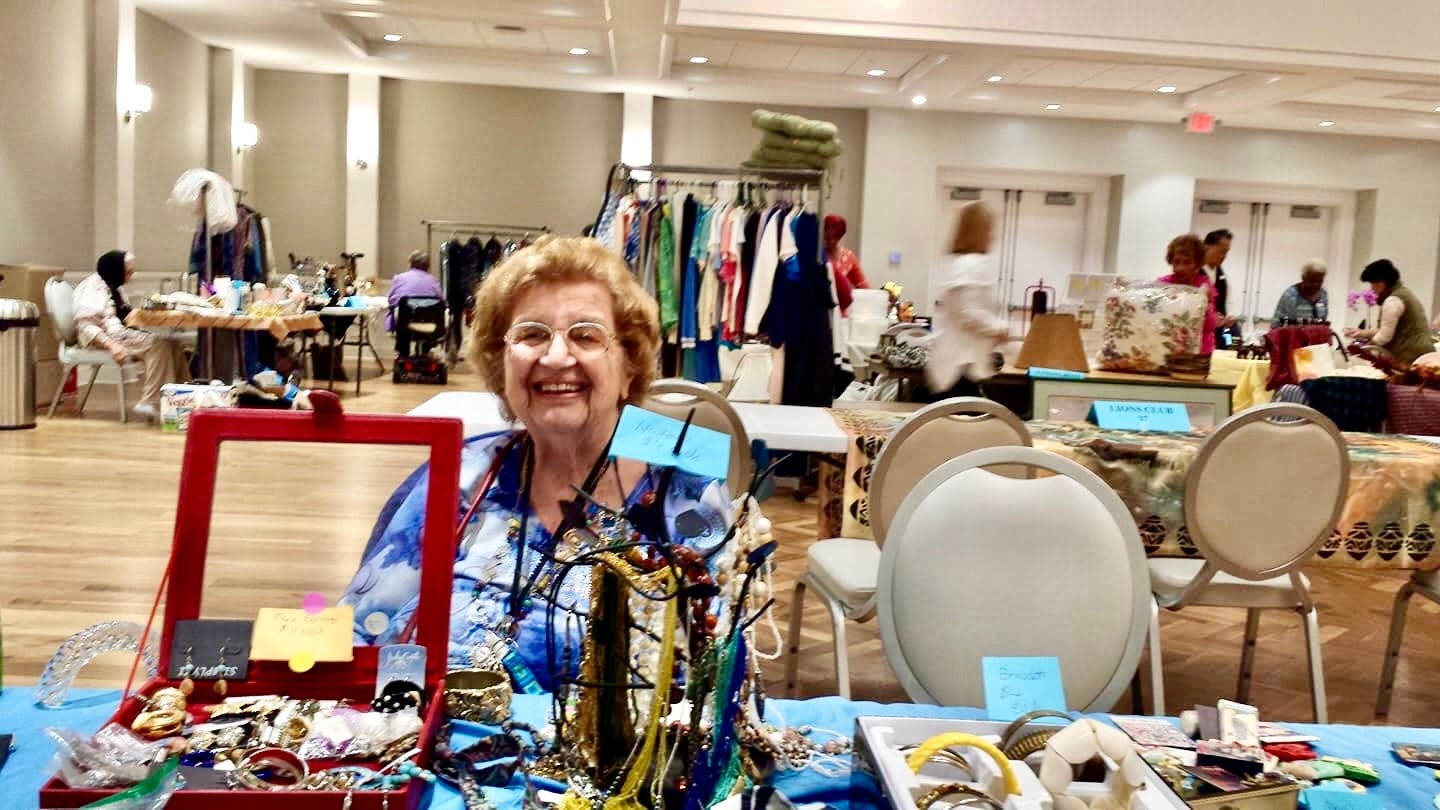
My mother, Evelyn, has always been able to sell anything to anyone. When I was 8, she first enlisted my help with her antiques business, convincing my school's principal that it was okay if I missed a few mornings of school each month for work. Mom sold the principal on the scheme by calling our job as roving hucksters "a great educational experience."
Mom and I rooted through people's castoffs at Maryland yard sales in the 1960s and ’70s. Typically, there were piles of junk with the occasional gorgeous gem hidden in the mix. I might discover a bold, mid-century print of abstract birds buried in a stack of scratched, unplayable record albums.
We hauled our merch to weekend antiques shows in Maryland, D.C., and Virginia in an enormous Mercury Marquis with the back seat removed specifically so we could pack in as much as possible.
I studied Mom's penchant for stretching the truth whenever she wanted to land a sale. If a prospective buyer wasn't sure about an item or said they were "just looking," Mom shifted into high gear, telling stories to make the products seem more valuable.
Mom and I rooted through people's castoffs at Maryland yard sales in the 1960s and ’70s. Typically, there were piles of junk with the occasional gorgeous gem hidden in the mix. I might discover a bold, mid-century print of abstract birds buried in a stack of scratched, unplayable record albums.
"Oh, I got that piece from a captain's wife," she'd say. A friend of mine once stopped by our booth at a show near a military base. She was awed by Mom's performance when a buyer responded with, "Which captain? I wonder if I know them."
Mom didn't miss a beat. "Oh, I'm so sorry, I just don't recall. I meet so many exciting people in this business." I never knew which elements of her stories were fabricated. She still insists that almost everything she said was only lightly exaggerated.
Sometimes I cringed when I pictured buyers proudly recounting those tales when they showed off their purchases, but comforted myself with the thought that customers likely enjoyed retelling Mom's overblown stories. I hoped it helped them believe their gems were more precious.
It wasn't until I was an adult that I learned why becoming a successful saleswoman was my mother's destiny. She had grown up in the Bronx during the Great Depression, the daughter of a second-hand vacuum salesman who sold door-to-door to support their family of seven. Mom was the second youngest of five kids but the one with the strongest sales drive at the time, so as a child, she assisted him, jumping in when he failed to close a sale. The pitch from his convincing daughter was so effective that buyers ponied up for those refurbished Hoovers.
She had grown up in the Bronx during the Great Depression, the daughter of a second-hand vacuum salesman who sold door-to-door to support their family of seven. Mom was the second youngest of five kids but the one with the strongest sales drive at the time, so as a child, she assisted him, jumping in when he failed to close a sale.
Mom put those skills to work in future jobs. She became a saleswoman for whom "no" meant revving up for advanced negotiations.
After her dad passed away, Mom revealed he’d been a terrible salesman. "He laid it on too thick," she said. "They saw his desperation. You have to reel customers in with a good story, make them believe they can't live without what you’re selling."
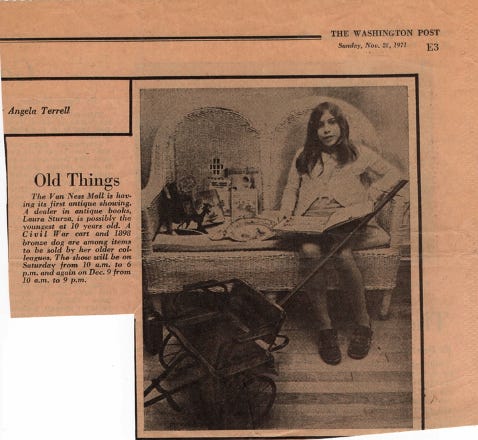
Over time, Mom parlayed her work as an antiques dealer into managing 30 antiques shows each year, featuring up to 100 dealers at malls, including Tysons Corner Center, Springfield Mall, and Wheaton Plaza. She was an entrepreneur 50 years ago, long before it was common for women to run their own businesses. I believe she was a workaholic, even before the term was coined in 1971.
I wondered whether she felt that with each antiques show and each dollar made, she was freed from her past, and could put to rest the memories of every door slammed on her and her father, in their eternal climbs up the staircases of those six-story Bronx walk-ups. But I was wrong.
Mom put those skills to work in future jobs. She became a saleswoman for whom "no" meant revving up for advanced negotiations. After her dad passed away, Mom revealed he’d been a terrible salesman. "He laid it on too thick," she said. "They saw his desperation. You have to reel customers in with a good story, make them believe they can't live without what you’re selling."
"No matter how successful I was, it didn't erase what my family went through," she recently said. "You don't forget living in poverty. It's what made me so good at my work."
Eventually, Mom stopped running shows, but ever the wheeler-dealer, she held onto a lot of merchandise. When she was 93, she recruited my husband and me to help her unload it. He and I schlepped her things to an indoor neighborhood sale at her retirement community.
There were about 40 other sellers in the large all-purpose room. It was packed with buyers, a rowdy group of oldsters trying to score some steals. My mom is all of five-feet-tall, but always upsold her height to five-feet-two-inches. She seemed taller when she closed a sale, which, as a younger woman, she did from a standing position. Now, she did business from her chair and employed her signature loud voice, no megaphone needed.
"I'm closing everything out…These are worth much more than the selling price… If you see two necklaces you like, take two for $7."
***
I didn't know the community sale we helped her run that day would be the last time I'd see Mom shine as a super saleswoman in the antiques business.
Later that year, she began needing more help with everyday tasks but resisted moving from her condo. I spent the next months employing the techniques she'd taught me by trying to sell her on the idea. We finally settled her into an assisted living place where she could get more support.
I didn't know the community sale we helped her run that day would be the last time I'd see Mom shine as a super saleswoman in the antiques business. Later that year, she began needing more help with everyday tasks but resisted moving from her condo. I spent the next months employing the techniques she'd taught me by trying to sell her on the idea. We finally settled her into an assisted living place where she could get more support.
Nowadays, she uses her skills to convince fellow residents to join her in art classes or creative writing workshops. Her unfailingly optimistic attitude means that if she catches one of the staff members feeling low, she peddles her personal brand of positive thinking.
"It's the secret to my longevity," she says. "Plus, my upbeat attitude helped me survive the pressures of running the business, and it didn't hurt with making all that gelt."
When Mom visits our home, it is as if she is walking through a museum of her career, marveling over the antiques she scored and gave me. While she has had some memory loss, she has an astounding recall of the origin story of these precious objects.
"Your father and I got this lampshade before you were born," she said, picking up the six-inch-tall, iridescent beauty. "We got it from an elegant, older lady on Capitol Hill."
She points to the painting of a street scene in Africa. "We got that on a trip to Philly. I told your father to follow the hand-lettered signs for a garage sale. He grumbled about it because we were late for a family visit, but I knew we would find something great there."
These stories and all her other embellishments are woven into the trinkets my mother has given me. I can never be sure whether each story is true or invented, and I no longer care.





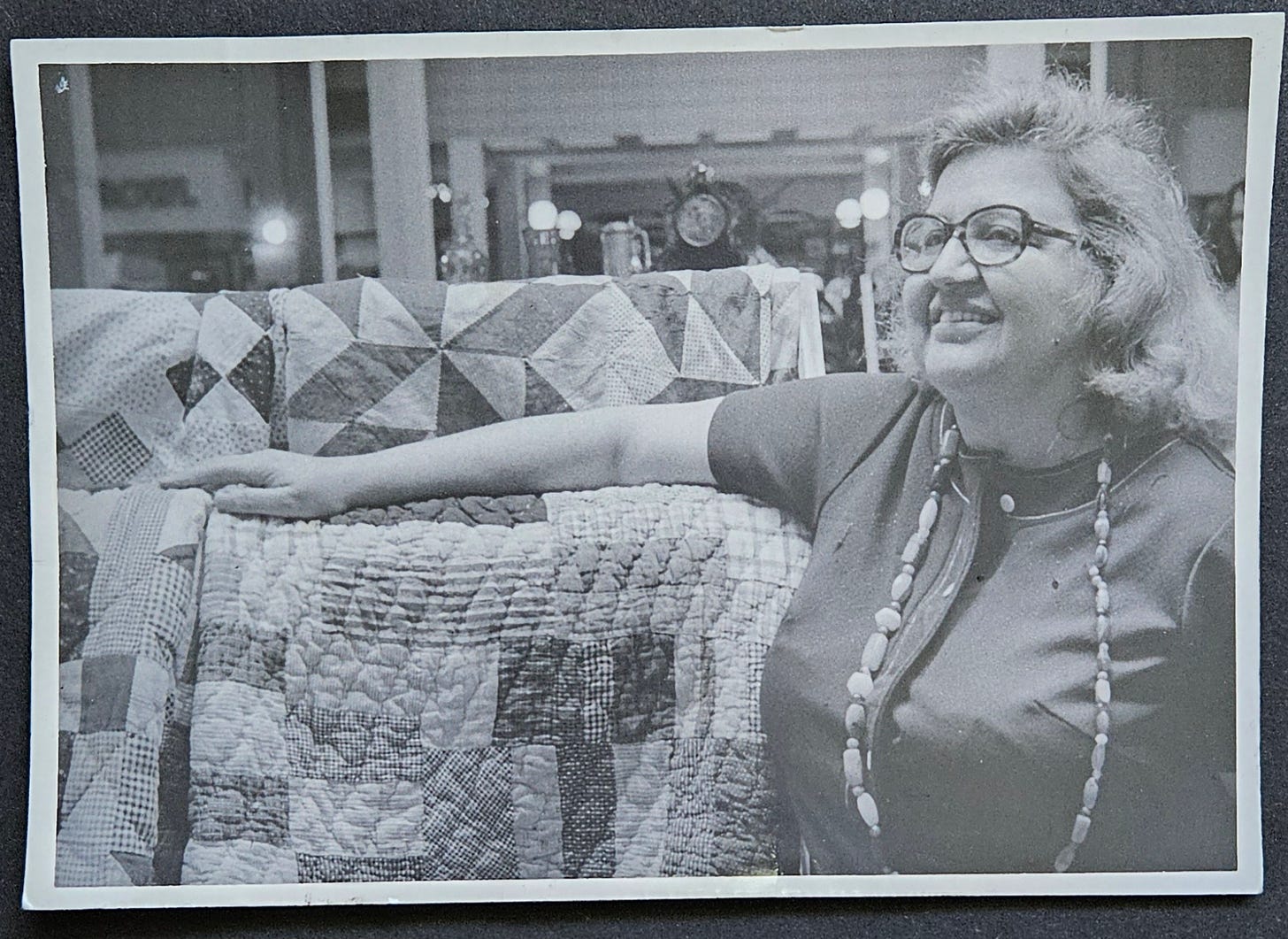
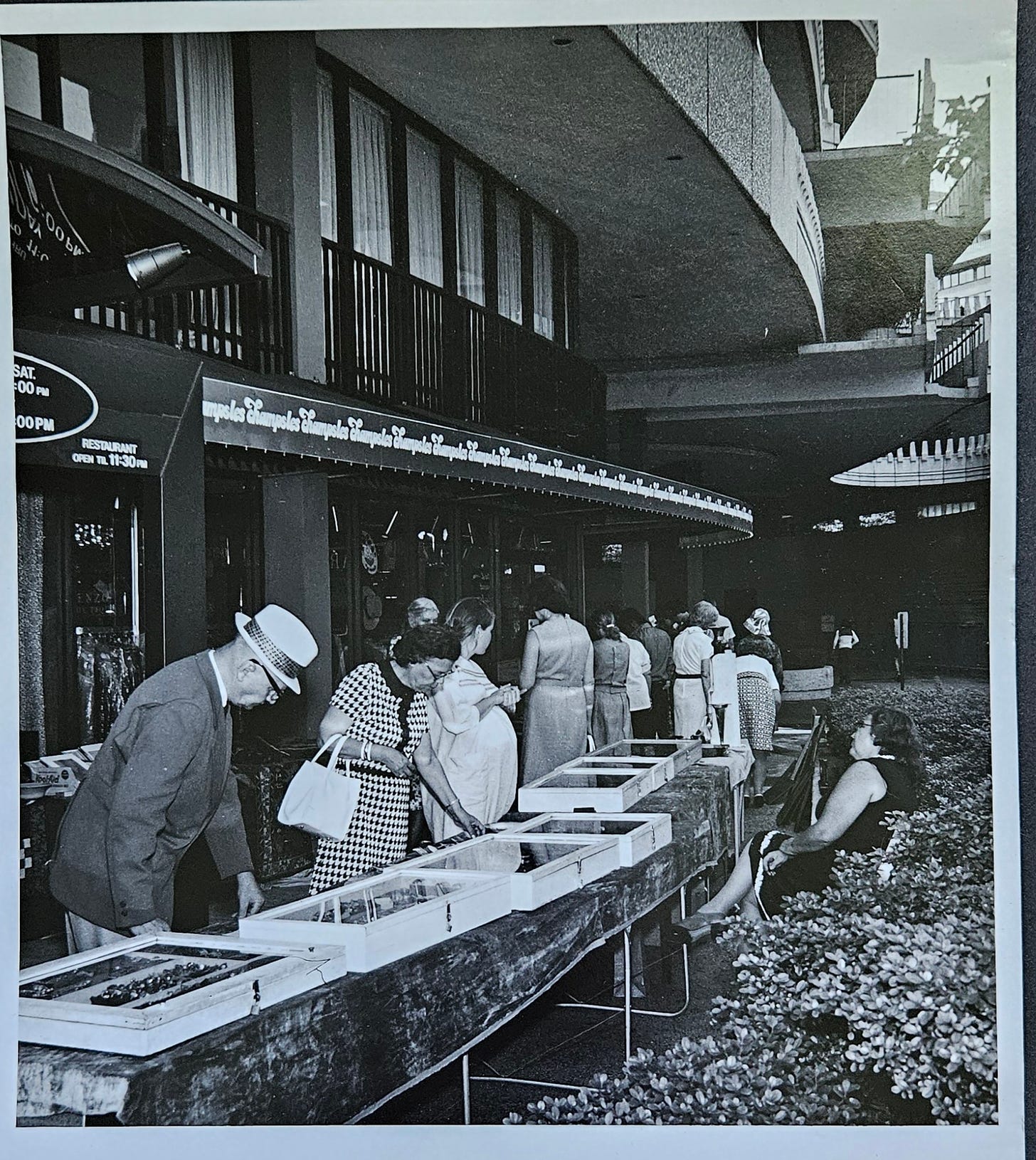
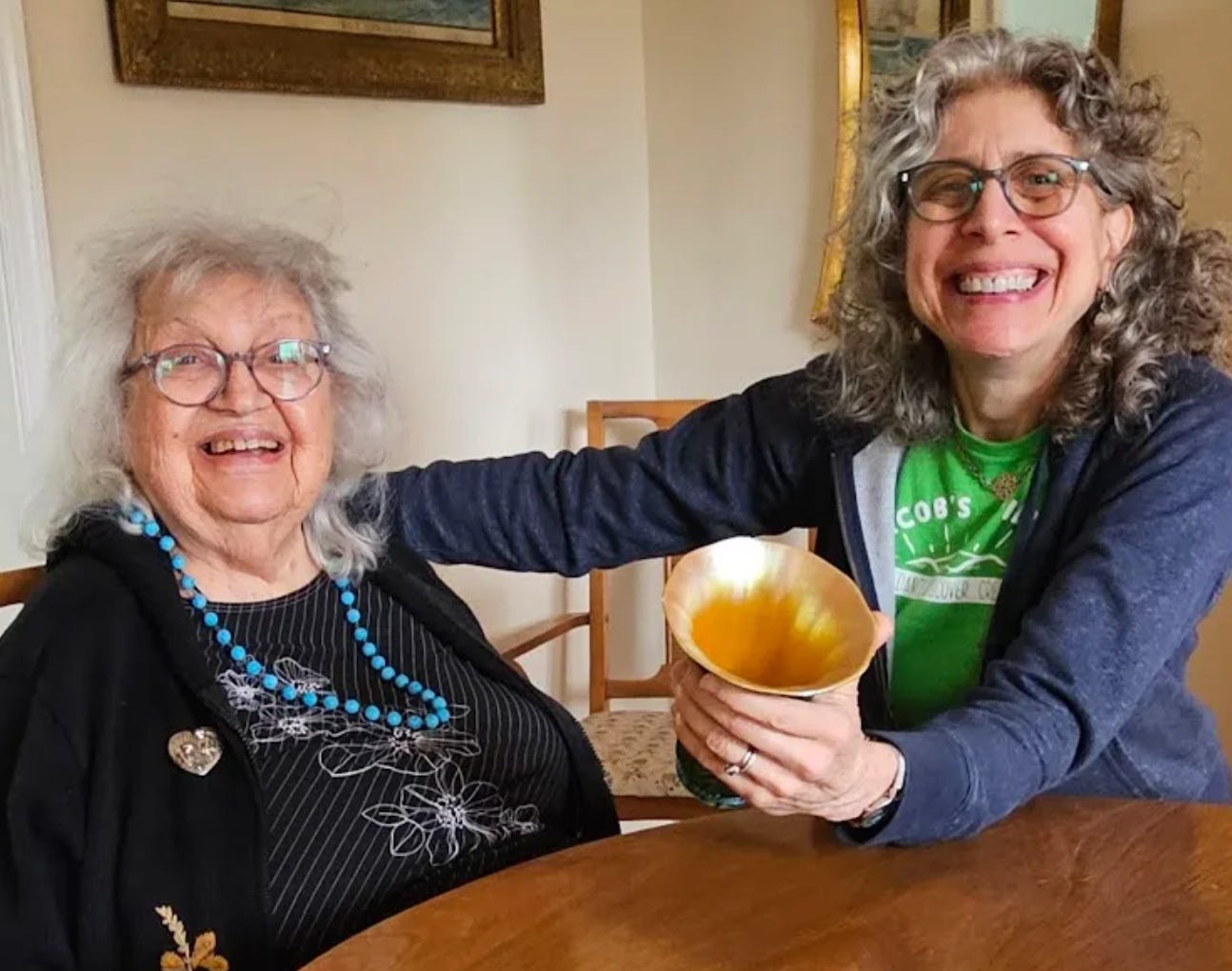

Your mom sounds like a force to be reckoned with. It does take some chutzpah to go through what she did and come out a winner. Great story!!
Yeah the oldsters who grew up during the depression are a different breed altogether. It’s etched deeply into their personalities.